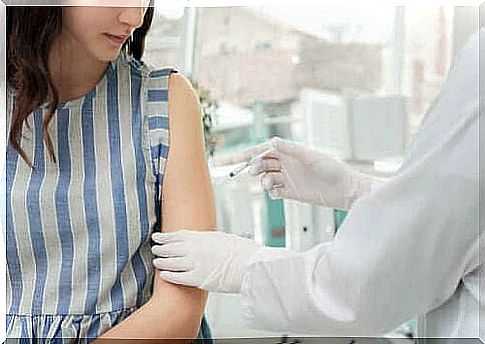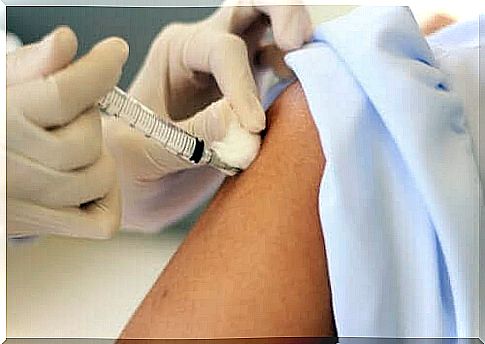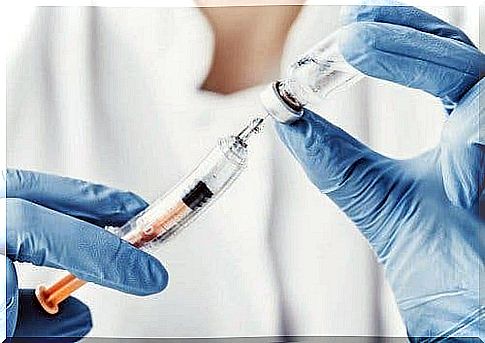Everything You Should Know About Allergy Vaccinations

Allergy vaccinations are one of the available treatments for allergic reactions. Sometimes they relieve symptoms. In other cases, they may even eliminate them completely after sustained treatment.
However, not everyone can get an allergy vaccination because there are no vaccines available for all types of allergies. Immunotherapy is a field of study that is still under development.
In any case, there are currently many myths about this and other vaccines. Read on to find out the truth about allergy vaccinations, what they are used for and their side effects.
What are allergies?
An allergy is an unwanted reaction that occurs after ingesting certain substances or being in contact with them. The number of substances that can cause allergic reactions is very large. These substances are allergenic substances that activate a major unwanted reaction in the immune system. Over time, this generates several effects.
Allergies can be mild or serious, and anaphylaxis is the most serious allergic reaction. It happens fast and its symptoms are fatal.
What are allergy vaccinations?

Allergy vaccinations are a treatment for allergies. Their purpose is to reduce or eliminate a person’s hypersensitivity to certain substances that produce an allergic reaction when it is not possible to avoid them.
Allergy vaccinations also help the body develop immunity to elements that lead to an allergic reaction. Doctors only use immunotherapy when other treatments or measures are not enough to treat the problem.
How do allergy vaccinations work?
Allergy vaccinations contain a small amount of the allergen, which causes a reaction in the person. The allergen is present in a pure form inside the vaccine. When injected, the body produces antibodies that prevent an allergic reaction.
Gradually, the doctor increases the dosage until – at best – the body becomes immune to the allergen. Usually, a person requires a period of three to five years before the symptoms are significantly reduced or disappear completely.
How they are administered
As a rule, the way allergy vaccinations are administered is intravenous. The treatment includes two phases:
- The first phase is the accumulation stage. In this phase, one gets a vaccine one to three times a week for a period of three to six months.
- The second stage is the maintenance stage. It lasts between three and five years. In this phase, one gets an injection either once a month or every six weeks. The doctor will evaluate the patient’s symptoms to determine when to stop treatment.
What types of allergy vaccinations are there?
There are no vaccines for all types of allergens. For example, their use is not a good idea in case of food allergy.
Vaccines are effective in cases of seasonal allergies, indoor allergens (mites, mold, cockroaches or pets) and those caused by insect bites.
When should you get an allergy vaccination?

Vaccines are only good for people with proven allergies through sensitization tests. However, they are not a good idea in the following cases:
- Children under 5 years or pregnant women.
- Patients with severe asthma or a heart condition.
- People taking certain medications, especially beta-blockers.
- People with adverse reactions to the vaccine.
Do they have side effects? Are they safe?
Overall, most people have no problems getting allergy vaccinations. However, some people have side effects. There may be redness, irritation and inflammation at the site where the vaccine was injected. However, they usually disappear quickly.
There are also cases where systemic reactions occur. This involves a stuffy nose, sneezing or hives. Sometimes there is sore throat, wheezing and pressure on the chest. In the most serious and rare cases, there may be anaphylaxis as well. This is the reason why you should always get the vaccine from a doctor.
Expected results
In general, there is a moderate improvement during the first year of treatment. It will be more visible during the second year. In most cases, there are no symptoms during the third year, even if the patient no longer receives the injections.
Some people will need more time and others will continue to have mild symptoms. When it comes to pet allergies, allergy sufferers should try to avoid all contact with them if possible.









